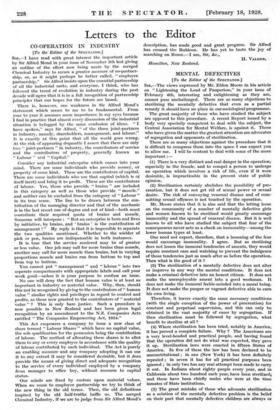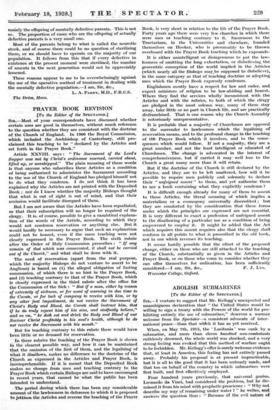MENTAL DEFECTIVES
[To the Editor of the SPECTATOR.] SIR,—The views expressed by Mr. Eldon Moore in his article on " Lightening the Load of Pauperism," in your issue of February 4th, interesting and enlightening as they are; cannot pass unchallenged. There are so many objections to sterilizing the mentally defective that even as a partial remedy it should have no place in our sociological programme.
The great majority of those who have studied the subject are opposed to this procedure. A recent Report issued by a body very specially competent to deal with the subject, the Central Association for Mental Welfare, is against it. Those who have given the matter the greatest attention are advocates of segregation and opponents of sterilization.
There are so many objections against the procedure that it is difficult to compress them into the space I can expect you to allow me. I will be content to deal with some of the more important :-
(1) There is a very distinct and real danger in the operation; especially in the female, and to compel a person to undergo an operation which involves a risk of life, even if it were desirable, is impracticable in the present state of public opinion.
(2) Sterilization certainly abolishes the possibility of pro- creation, but it does not get rid of sexual power or sexual desire. The risk of conveying venereal disease and of com-; mitting sexual offences is not touched by the operation.
Mr. Moore states that it is also said that the letting loose on the community of a number of mentally defective girls and women known to be sterilized would greatly encourage immorality and the spread of venereal disease. But it is well known to all who have studied the subject that fear of the consequences never acts as a check on immorality—among the lower human types at least.
One need not expect, therefore, that a lessening of the fear would encourage immorality. I agree. But as sterilizing does not lessen the immoral tendencies of aments, they would require constant care and watching to prevent the indulgence of those tendencies just as much after as before the operation. Then what is the good of it ?
(3) The sterilization of a mentally defective does not alter or improve in any way the mental conditions. It does not make a criminal defective into an honest citizen. It does not make the unemployable ament into a good workman. It does not make the immoral feeble-minded into a moral being. It does not make the pauper or vagrant defective able to earn his own living.
Therefore, it leaves exactly the same necessary conditions (with the single exception of the power of procreation) for constant and perpetual supervision, and this can only be obtained in the vast majority of cases by segregation. If then sterilization must be followed by segregation, what benefit to sterilize at all ?
(4) Where sterilization has been tried, notably in America, it has proved a complete failure. Why ? The Americans are a very level-headed and practical people, and having found that the operation did not do what was expected, they gave it up. Sterilization laws were enacted in fifteen States of America. In five of these the law has been declared to be unconstitutional ; in one (New York) it has been definitely repealed ; in seven it has for all practical purposes been ignored ; in only two has any real attempt been made to carry it out. In Indiana about eighty people every year, and in California about two hundred each year, have been sterilized; and these have been chiefly males who were at the time inmates of State institutions.
(5) The great mistake of those who advocate sterilization as a solution of the mentally defective problem is the belief on their part that mentally defective children are always or mainly the offspring of mentally defective parents. -This is not so. The proportion of cases who are the offspring of actually defective parents is a very small one.
Most of the parents belong to what is called the neurotic stock, and of course there could be no question of sterilizing them, or we should have to operate on the majority of our population. It follows from this that if every defective in existence at the present moment were sterilized; the number of aments in the next generation would not be appreciably lessened.
These reasons appear to me to be overwhelmingly against the use of the operative method of treatment in dealing with the mentally defective population.—I am, Sir, &c.,







































 Previous page
Previous page